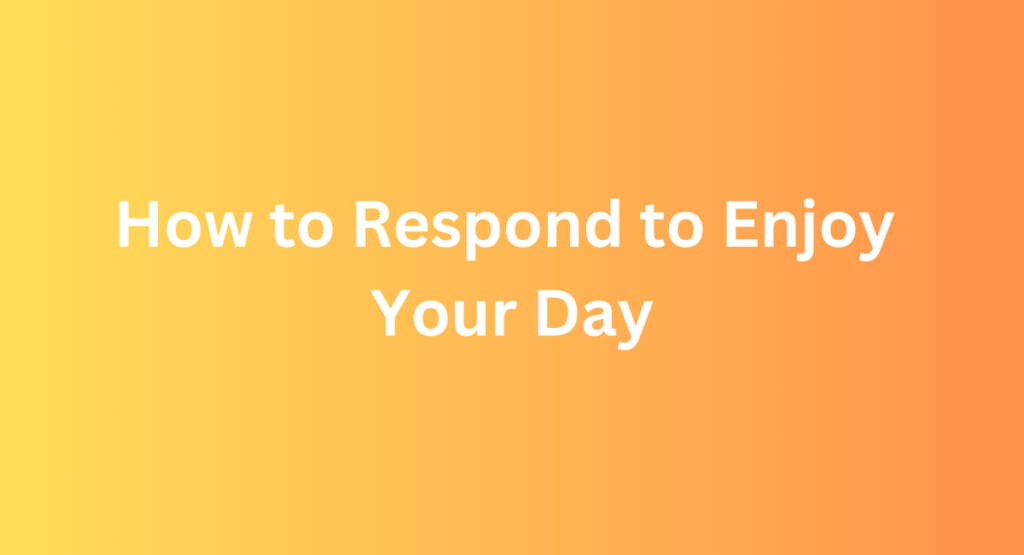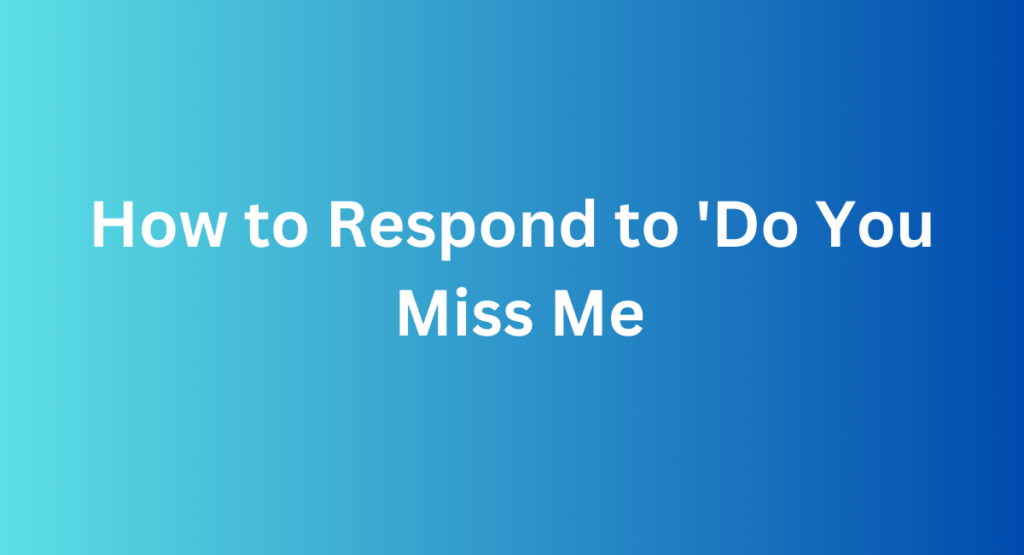When faced with “I don’t know”, acknowledge the uncertainty and offer to find the answer. Remaining calm and supportive can facilitate problem-solving and collaboration.
Navigating situations where someone replies with “I don’t know” requires tact and understanding. Often, responding positively and proposing to explore the topic further can lead to productive outcomes. By approaching the conversation with openness and willingness to seek solutions together, you can turn uncertainty into a learning opportunity.
How To Respond To I Don’t Know
When faced with the response “I don’t know,” it’s helpful to remain calm and offer support. Encourage the person to take their time and consider their thoughts before responding. Validate their feelings and provide reassurance that it’s okay not to have all the answers.
How To Respond To “i Don’t Know”
When faced with someone saying “I don’t know,” it can be challenging to know how to respond effectively. Whether in a professional setting or a personal conversation, knowing how to navigate this response can be crucial. Below are some strategies and tips for effectively responding to the “I don’t know” statement.
Strategies For Responding
- Acknowledge the Response: When someone says “I don’t know,” it’s essential to acknowledge their honesty and transparency. Show understanding and empathy in your response to create a supportive environment.
- Explore Further: Encourage the individual to elaborate on why they are unsure. Ask open-ended questions to delve deeper into the topic, which can help uncover underlying issues or concerns.
- Offer Assistance: If appropriate, offer your support and assistance in finding the answer. Whether it’s providing resources or collaborating to find a solution, offering help can show your willingness to support them.
- Shift the Focus: Sometimes, the “I don’t know” response may indicate a lack of confidence or fear of judgment. By shifting the focus from the individual to the issue at hand, you can alleviate pressure and help them feel more comfortable exploring the topic.
Helpful Tips For Effective Responses
- Remain Patient: Responding to “I don’t know” requires patience and understanding. Avoid pressuring the individual for an immediate answer and provide them with the time and space to process their thoughts.
- Empower Critical Thinking: Encourage the individual to think critically about the situation. By empowering them to analyze and evaluate their knowledge, you can help promote a growth mindset and confidence in finding solutions.
- Provide Encouragement: Offer words of encouragement and support as they navigate their uncertainty. Positive reinforcement can help boost their confidence and motivation to seek solutions.
- Follow-Up: After the initial response, consider following up with the individual to see if they have had any further insights or if they require additional assistance. This demonstrates your genuine interest in helping them overcome their uncertainty.
Responding to “I don’t know” can be an opportunity to foster trust, communication, and problem-solving skills. By understanding how to respond effectively, you can create an environment that encourages open dialogue and collaboration.
Best Text Respond To I Don’t Know
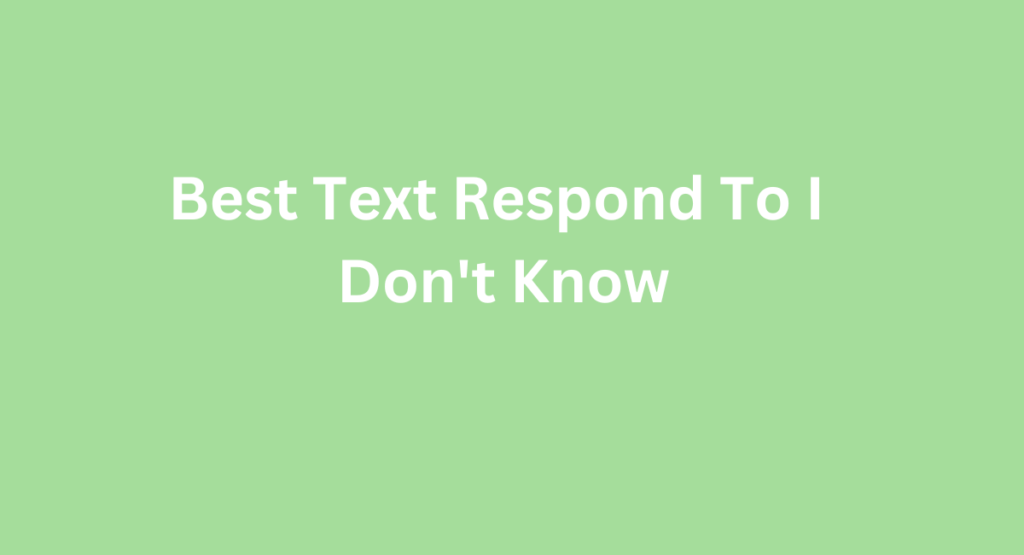
Looking for the best text to reply to when someone says “I don’t know”? Try saying something like, “Let’s find out together” or “It’s okay not to have all the answers. ” These responses show empathy and willingness to help without dismissing the uncertainty.
Best Text Responses To “I Don’t Know”
When faced with the phrase “I don’t know” in a conversation, it can sometimes catch us off guard. Knowing how to respond in these situations can help navigate the conversation smoothly. Here are some helpful text responses to handle the uncertainty:
- Acknowledge and Reassure:
- Respond with empathy, acknowledging their uncertainty, and offer reassurance that it’s okay not to have all the answers.
- Ask Clarifying Questions:
- Politely inquire if there is a specific aspect they are unsure about to gain more context and provide guidance accordingly.
- Offer Support:
- Show willingness to assist in finding the information or exploring together to uncover the answer collaboratively.
- Redirect with Positivity:
- Redirect the conversation towards exploring possibilities or seeking solutions rather than dwelling on the unknown.
– “Let’s figure it out together. What are your thoughts?”
– “That’s okay, we can explore it together.”
– “No worries, we can brainstorm some options.”
– “It’s alright not to know everything. We’ll work through it.”
– “That’s okay, we can take some time to think about it.”
– “We can research it together if you want.”
– “We can always seek advice or find someone who knows.”
– “Not knowing is the first step to learning something new.”
– “That’s fine, let’s break it down and see if we can find the answer.”
– “It’s okay to be uncertain. Let’s tackle it step by step.”
Remember, responding with understanding and support can help alleviate any tension and keep the dialogue open and constructive. Flexibility and empathy go a long way in navigating uncertain situations effectively.
Funny Reply To I Don’t Know
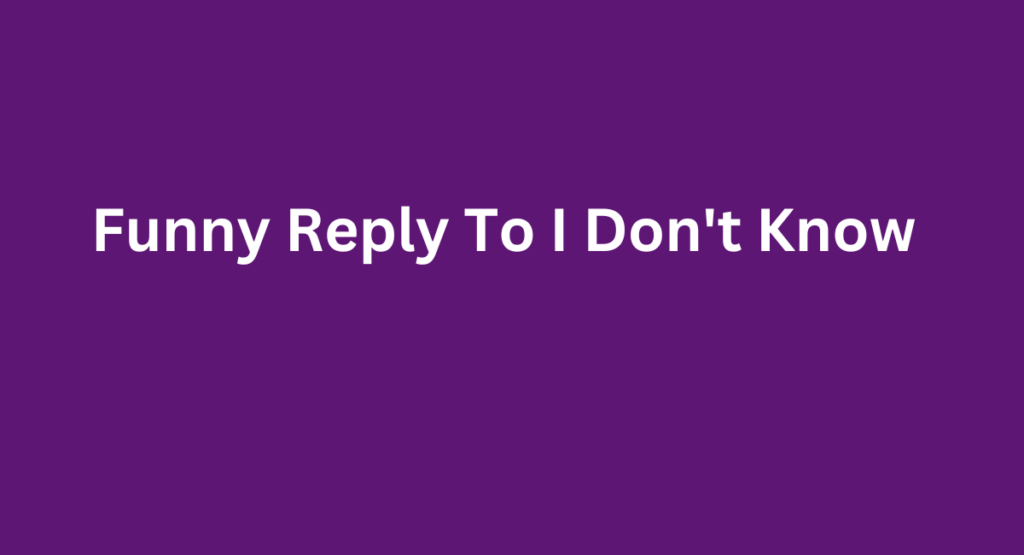
Need a quick-witted comeback for “I don’t know”? Try saying, “Well, Google probably knows!” For a light-hearted response. This playful reply can spark a chuckle and keep the conversation upbeat.
Funny Replies To “I Don’t Know”
In social situations, hearing “I don’t know” can sometimes leave us stumped. But fear not, adding a touch of humor to your response can lighten the mood and keep the conversation flowing. Here are a few witty comebacks to the famous phrase:
- “I don’t know…but give me a minute, I’ll Google it and pretend I knew all along! “: Embracing the power of technology with a hint of playfulness.
- “I don’t have all the answers, but thankfully, I have a great selection of dad jokes! “: Injecting humor with a dad joke arsenal to keep things light-hearted.
- “I don’t know, but if I did, it would probably involve a unicorn and a catapult! “: Embracing the absurdity with a sprinkle of whimsy.
– “Well, at least we can be clueless together! 😄”
– “Join the club of ‘I Don’t Know’ anonymous! Population: us. 😂”
– “Looks like our brains took a vacation without telling us! 😅”
– “Guess we’ll have to ask the magic 8-ball instead! 🎱”
– “Welcome to the land of Mysteries, where even the wise are baffled! 🤷♂️”
Remember, humor is a universal language that can bridge gaps in conversations and turn moments of uncertainty into laughter-filled memories. So, next time someone hits you with an “I don’t know,” don’t be afraid to whip out one of these witty responses!
Savage Reply To I Don’t Know
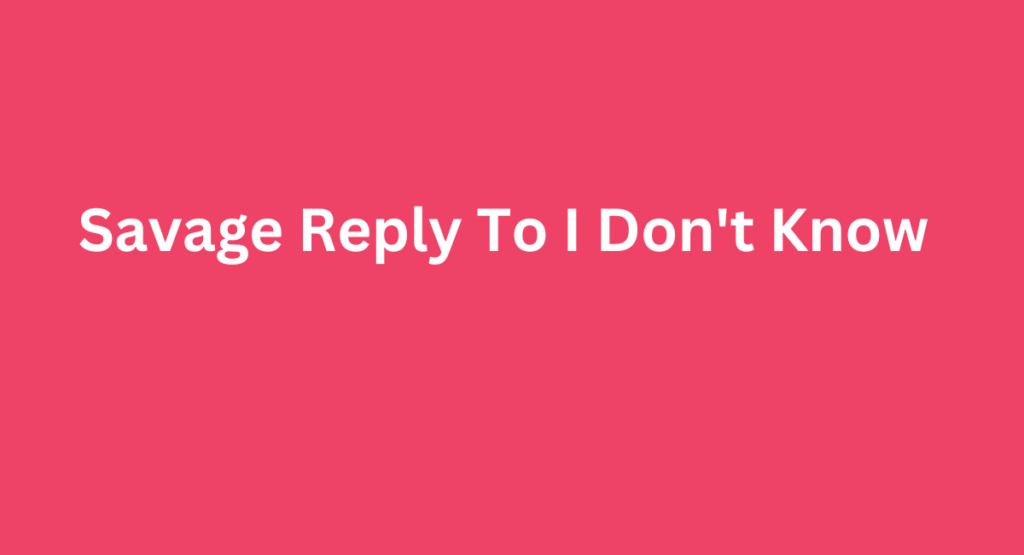
Struggling with the phrase “I don’t know”? Responding with a savage tone isn’t the best approach. Instead, consider responding with empathy and patience, ask clarifying questions, or offer to help find the answer together. This approach can foster positive communication and build trust.
Savage Reply To “I Don’t Know”
Are you tired of hearing “I don’t know” as a response? Whether it’s in a professional setting or just an everyday conversation, sometimes it’s tempting to throw in a little sass when faced with this answer. Let’s explore some savage yet witty and smart ways to respond to the infamous phrase “I don’t know.
Snappy Comebacks
- “Wow, it’s like the answer to the universe’s biggest mystery is ‘I don’t know’.”
- “Are you a human-shaped magic 8-ball?”
- “You’re like a walking shrug emoji.”
Quick Tips For A Sharp Response
- Make a lighthearted joke to disarm any tension.
- Use your body language to convey a playful tone.
- Keep the tone light and humorous, avoiding any hostility.
– “Looks like Google’s taking a day off too. 😏”
– “Well, ignorance is bliss… for you, I guess. 😎”
– “Ignorance must be contagious. Don’t get too close. 😷”
– “Congratulations, you just discovered a new level of cluelessness. 🎉”
– “I don’t know either, but at least I’m not pretending it’s a mystery of the universe. 😏”
– “Ah, the classic ‘I Don’t Know’ maneuver. Never fails to impress. 😒”
– “It’s okay, being lost in the abyss of confusion is your thing, after all. 💁♂️”
– “Welcome to the club of the perpetually perplexed. Membership: you. 🤷♂️”
– “Did someone hit the ‘I Don’t Know’ button again? Oh, it’s just you. 😒”
– “It’s like watching a live performance of ‘The Chronicles of Ignorance,’ starring you. Bravo. 👏”
Responding to “I don’t know” can be an opportunity to inject some humor and wit into the conversation, as long as it’s done in good spirits. Embrace the unexpected and use these savage replies to keep the conversation engaging and entertaining!
Polite Response I Don’t Know
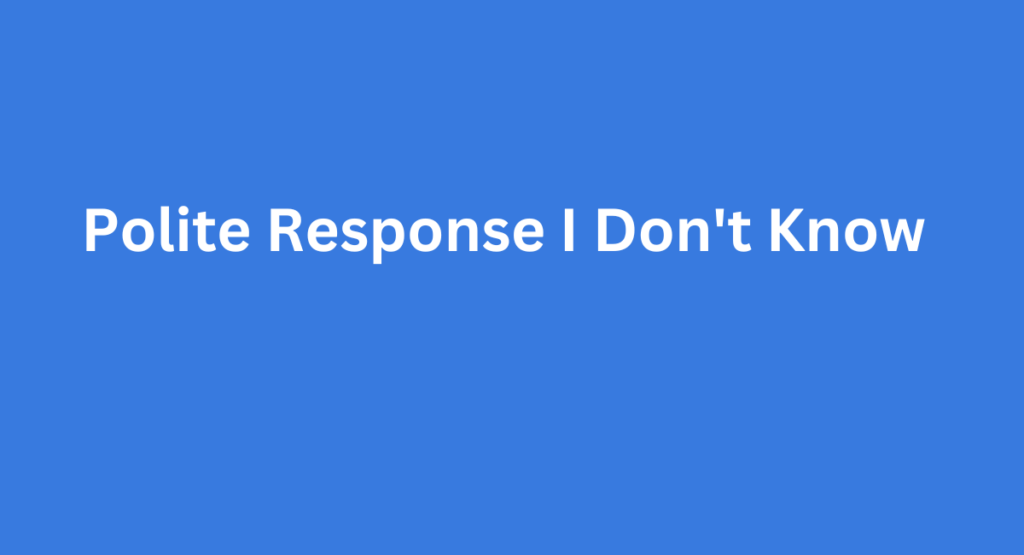
When faced with the query “I don’t know,” it’s important to respond politely and effectively. Offer assistance, suggest further research, or simply acknowledge the lack of information to maintain a positive and helpful interaction.
Polite Response To “I Don’t Know”
In conversations, it is common for someone to respond with “I don’t know” when faced with a question or situation they are unsure about. It can be frustrating to receive this response, especially if you are seeking information or assistance.
However, it is important to respond politely to maintain a respectful and constructive conversation. Below are some ways you can respond politely to someone who says “I don’t know”:
When someone says “I don’t know,” it’s crucial to respond respectfully and encourage further discussion. By doing so, you can create a positive environment that promotes learning and collaboration.
- Express understanding: Respond empathetically to the person by saying something like, “That’s okay, I understand it can be difficult to know everything.”
- Offer assistance: Show your willingness to help by saying, “If you need any assistance, feel free to ask. I’m here to support you.”
- Encourage exploration: Encourage the person to explore the topic further by suggesting, “Maybe we can explore this together and find the answer.”
- Provide alternatives: Offer alternatives such as, “If you’re not sure, perhaps we can seek advice from someone who might know.”
- Appreciate honesty: Acknowledge the person’s honesty and say, “I appreciate your honesty. It’s better to admit when we don’t know something than provide incorrect information.”
– “That’s alright, we can look into it together.”
– “No problem, let’s find the answer together.”
– “Thank you for being honest. Let’s see if we can find the information.”
– “I appreciate your honesty. Let’s explore this further.”
– “That’s okay, we can try to figure it out together.”
– “It’s alright not to have all the answers. Let’s see what we can find.”
– “I understand. Let’s see if we can gather more information.”
– “I appreciate you letting me know. Let’s work on finding a solution.”
– “That’s fine, we can take some time to research and come back to it.”
– “Thank you for your honesty. Let’s see if we can find someone who knows.”
Remember, maintaining a respectful and understanding attitude is crucial when someone says “I don’t know. ” By responding politely, you can foster a positive atmosphere for learning and collaboration.
Friendly Response I Don’t Know
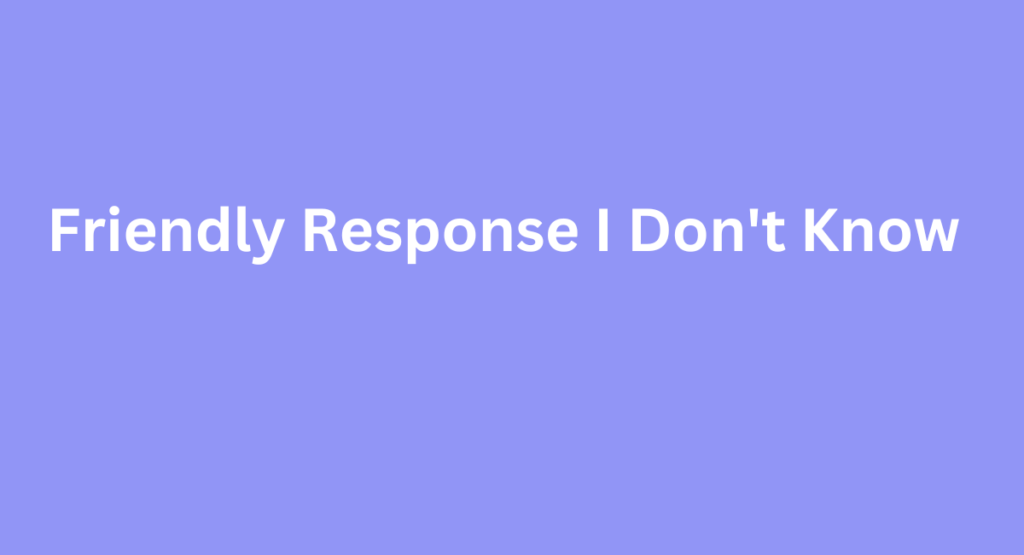
Responding to “I don’t know” can be challenging. However, you can ask for clarification, suggest resources, or offer to find the answer together to provide a helpful and friendly response.
Friendly Response To “I Don’t Know”
So, someone has just hit you with the classic “I don’t know” response. It can be frustrating and disheartening when you’re seeking answers or guidance. But fear not! This article will equip you with some friendly and effective ways to respond when faced with this seemingly vague and unhelpful reply.
Offering Empathy And Understanding
- Let them know you understand their predicament: Respond with empathy and reassurance, such as “I completely understand that sometimes we all encounter things we’re unsure about.”
- Show support and encouragement: Say something like “No worries, we’ll figure it out together! It’s alright not to have all the answers right away.”
Encourage Curiosity And Exploration
- Suggest exploring together: You can respond with an invitation to explore the question further together. For example, “Let’s dive in and do some research to find out more. It’ll be an exciting journey!”
- Share helpful resources: Point them in the direction of resources such as articles, forums, or videos that might help them gain more knowledge on the subject.
Encourage Self-reflection And Problem-solving
- Encourage them to think it through: Respond with a gentle nudge to reflect on the question or problem. For instance, “Take a moment to think about it, you might surprise yourself with what you come up with!”
- Ask open-ended questions: Help stimulate their critical thinking by asking thought-provoking questions related to the topic. It might help them discover alternative routes to finding the answer.
Suggest Seeking Different Perspectives
- Recommend seeking other opinions: Suggest reaching out to others who might have more knowledge or expertise in the subject. For example, “Why not ask [insert name of an expert in the field] for their insights? They might have some valuable information to share.”
- Highlight the importance of diverse perspectives: Emphasize the benefits of considering different viewpoints on the topic, which can lead to a more comprehensive understanding.
– “No worries, we’ll figure it out together.”
– “It’s okay, we can learn together.”
– “That’s alright, let’s find out together.”
– “Thanks for being honest, we’ll work on finding the answer.”
– “It’s okay not to know everything, let’s see if we can find the information.”
– “No problem, we can explore it together and see what we discover.”
– “That’s okay, we can take our time to find the answer.”
– “Thanks for letting me know. Let’s see if we can find the solution.”
– “It’s okay to be unsure, we’ll try to find the answer together.”
– “No worries, we can seek help or do some research together.”
No one knows everything, and it’s okay to encounter moments of uncertainty. Responding with empathy, curiosity, and encouragement can foster a positive environment for growth and learning. So the next time you hear “I don’t know,” remember that it’s an opportunity to explore, reflect, and gain new insights.
Happy questioning!
Frequently Asked Questions On How To Respond To I Don’t Know
How Can I Respond To “I Don’t Know” Politely?
Respond with empathy, saying something like “That’s okay, we can figure it out together. ” Encourage the person to ask questions and offer your assistance. Focus on creating a supportive and collaborative atmosphere to help them feel comfortable sharing their uncertainties.
How Can I Turn “I Don’t Know” Into A Learning Opportunity?
Approach it as an opportunity for growth. Encourage curiosity and critical thinking by asking open-ended questions that can guide them toward finding the answer. Suggest looking up reliable sources or seeking advice from experts. This mindset can foster a passion for learning and problem-solving.
What Alternative Phrases Can I Use Instead Of Saying “I Don’t Know”?
Instead of admitting not knowing something, you can respond with phrases like “I will find out for you,” “Let me look into it,” or “I’m not entirely sure, but I can help you find the answer. ” These alternatives show your willingness to assist and make the conversation more productive.
Conclusion
In handling “I don’t know” situations, stay calm and inquisitive. Stay curious, and ask open-ended questions to gather more information. Remember that it’s okay not to have all the answers. By keeping a positive attitude, you can find creative solutions.
So, embrace the unknown and approach it as an opportunity for growth.


